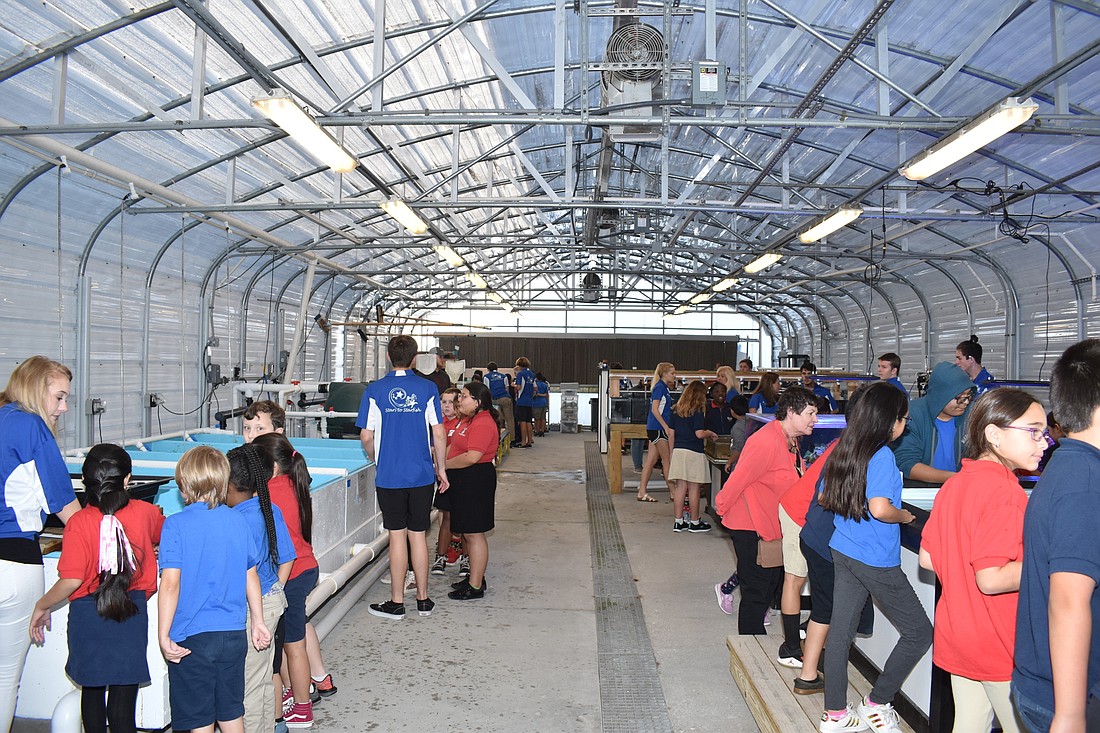- November 23, 2024
-
-
Loading

Loading

Morgan Windsor held her hand underwater and waited for a puffer fish to swim up and rest in her palm.
The fish, named E.T., is part of Riverview High School’s aquaculture program, which aims to educate Sarasota elementary students about marine life and its 20 interns on proper research methods. Windsor is one of the high school marine biology students who interns in the program, called Stars to Starfishes.
Riverview built its aquadome, where the fish and other marine life live, in 2011. Katrin Rudge, the marine biology teacher at Riverview, wrote grant requests for years to raise money to build the facility behind the school.
“We started off with elementary school kids in Sarasota coming to do field trips in the planetarium, and now they come and look at the starfish, too, in the aquadome. That’s why we call it Stars to Starfishes.”
Elementary students who first experienced the program on field trips now work in the program.
“It’s amazing to see and hear what they remember of the program, and what they’re doing now and why they wanted to be in the program,” Rudge said
GPA and other factors are considered before juniors and seniors are accepted into the program. All applicants are required to take the school’s Marine Biology I class to qualify for consideration.
Windsor, who has been an intern for two years, said the experience has made her want to pursue marine biology in college and as a career.
She said she admires the two white bamboo sharks — Cosmo and Wanda — the most. They were hatched five years ago from eggs at the school.
“They’re so friendly, which we don’t usually think about when we think of sharks,” Windsor said.
Students take care of the fish in the environment, but also perform research through experiments.
One of the experiments completed this year examined the level of salinity mangrove trees can grow in, and what elements in the water can make them grow faster and stronger.
Since 2011, the program has grown from humble beginnings to about 50 tanks of various sizes. The program has teamed with Mote Marine Laboratory and Aquarium to raise juvenile snook to repopulate nearby Phillippi Creek.
The students take care of the snook from a young age and monitor the salinity it takes in their water to survive before they mature.
Izabela Burns, one of the biology students who plans to be an intern next year, already works in the aquadome because her mother, Sharon Karasick, is one of the teachers in charge of the project.
“I help with some of the fish sometimes, but I’m excited to be a part of the internship next year,” Burns said as she helped move the snook into the tanks where they will be monitored and researched.
Karasick has been a biology teacher at Riverview for a year. She wants to get the program producing an income to become self-sustaining and not reliant on grants.
“We want to be able to eventually build a permanent facility rather than what we have now. We want to start making a profit,” Karasick said.
The interns are working on raising clownfish from eggs, fostering them into adulthood and pairing them off into two fully grown mated pairs and waiting for them to produce their own clownfish.
The clownfish are for sale for anyone who wants to buy them.
In the future, Karasick said the program is looking to do the same thing with seahorses as it does with clownfish.